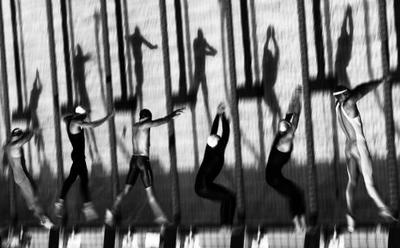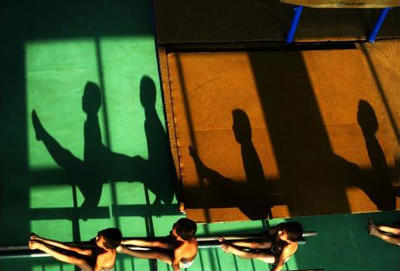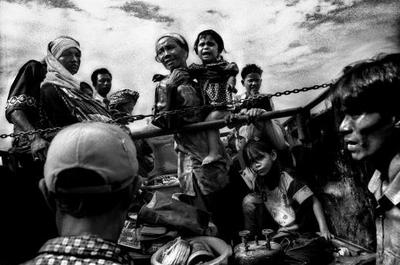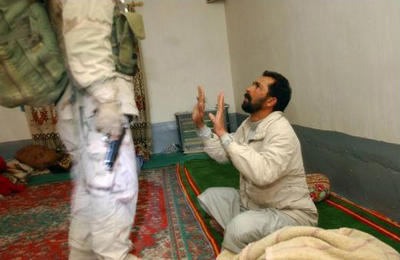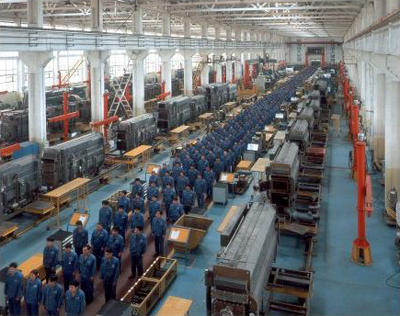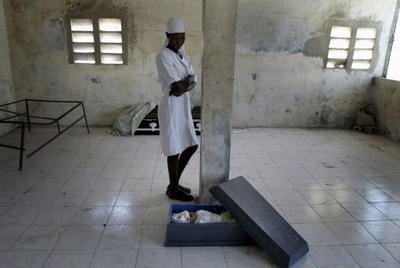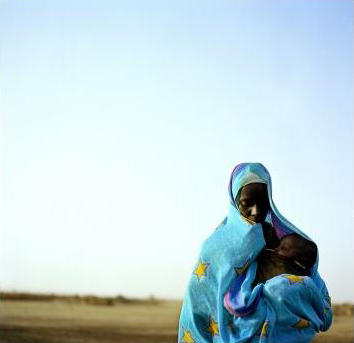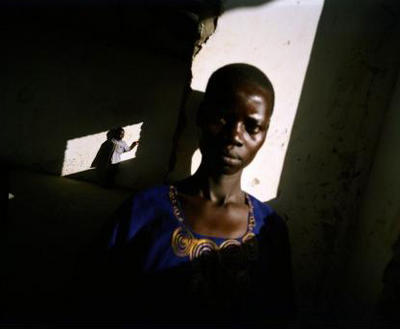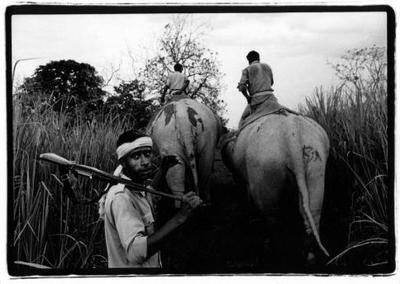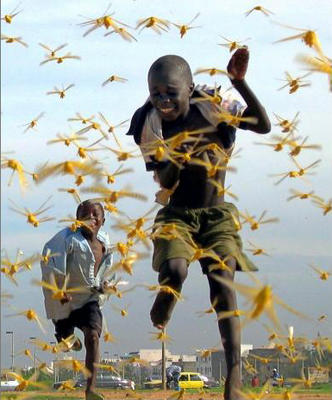outubro 07, 2005
World Press Photo 05
Como já havia referido aqui - embora o período da exposição tenha sido alterado -, decorre até 23 de Outubro no Centro Cultural de Belém a World Press Photo 05. A Galeria dos Vencedores pode ser visitada aqui.
O conjunto de imagens que se segue resulta naturalmente de uma escolha pessoal; ou porque a imagem me tocou, ou pelo contexto em que foi captada ou, ainda, pelas notas que tirei durante a visita.
Os textos originais que acompanham as fotos desempenham um papel significativo no enquadramento do trabalho destas pessoas no nosso quotidiano, bem como um espaço de reflexão. Como sempre.
Ian Thorpe of Australia starts from lane four and Pieter van den Hoogenband of the Netherlands from lane five, during the heats of the men's 200m freestyle at the Olympic Games in Athens in August.
Both were tipped to win the event. Thorpe beat the Dutch swimmer by 0.10 seconds in the heat, and went on to beat him again in the final, breaking an Olympic record in the process.
Some 140 children, from four to ten years old and coming from all over China, study at the Li Xiaoshuang Gymnastics School in Xiantao, in central China's Hubei province.
Chinese Olympic gold medallists Li Xiaoshuang, Yang Wei and Zheng Liwei all studied at this academy. Training is arduous, but China's success in Olympics-level gymnastics has encouraged greater numbers of parents to send their offspring to this and similar sports schools.
Jimmy Cates, 8, of Prior Lake, Minnesota, is placed fourth out of four competitors in his first wrestling tournament, at Prior Lake High School, in January.
The Indonesian province of Aceh, on the western tip of Sumatra, was closest to the epicenter of the December 26 earthquake that unleashed massive tidal waves in the region, and bore the full brunt of the destruction. Over 70 percent of the inhabitants of some coastal villages in Aceh lost their lives as a result of the tsunami.
In Indonesia as a whole more than 110,000 people were killed, and over 800,000 made homeless. International aid organizations had long been denied access to Aceh because of ongoing conflict between Indonesian security forces and separatist rebels, but once the scale of the disaster became clear, the government relaxed restrictions.
On September 1 a group of Chechen militants occupied School Number One in the town of Beslan, in the neighboring Russian province of North Ossetia. They herded 1,221 teachers, parents and pupils into the school gymnasium, and set up bombs and booby traps to prevent any surprise attack, issuing a series of demands that included withdrawal of Russian troops from Chechnya and the release of prisoners.
After two days of negotiations, bombs inside the school were detonated, in circumstances that were unclear, killing many hostages instantly. Russian special forces stormed the building. School Number One was liberated, but 338 people were dead, more than half of them children.
Conflict between insurgents and coalition forces in Iraq continued throughout the year. Opposition ranged from anti-American demonstrations, to guerilla activity and open confrontation.
The military responded with raids on homes thought to harbor insurgents, and full-scale attacks on dissident strongholds.
In recent years China has grown to become the world's fifth largest exporter of merchandise, and has one of the world's fastest growing economies.
A huge influx of migrant workers is required to meet demand in city factories.
A mother stands beside her dead baby in a makeshift morgue at the hospital in Gonaïves, Haiti, in February. The hospital had been closed since rebels revolting against President Jean-Bertrand Aristide had taken control of the city early in the year.
The baby had been born shortly before fighting began, and had not received any hospital care. Unrest in Haiti had been growing ever since disputed election results in 2000, with Gonaïves as a particular flash point, and both sides blaming each other for the violence. Law and order broke down in many places, with looters ransacking stores, businesses, government buildings and hospitals.
Around two million people fled their homes, and at least 150,000 were thought to have died, as a result of violence that had affected the Darfur region of Sudan since early 2003.
Rebel groups such as the Sudan Liberation Army (SLA) and the Justice and Equality Movement (JEM) claimed that Sudan's government was oppressing black Africans in favor of Arabs.
The government was accused of lending support to Arab militias such as the Janjaweed, which rebels said was conducting ethnic cleansing in the Dafur area.
Lilian, 23, was kidnapped from her village in Uganda by rebel fighters of the Lord's Resistance Army (LRA) when she was 12 years old. The Ugandan government has been unable to end insurgency by the LRA in the region, and rebels have killed or kidnapped many thousands of people.
After a week-long march across the border into Sudan, Lilian was given as a bush-wife to a rebel commander, who raped her that night. She bore her first child, a son she named Oryema, when she was 14. Lilian stayed with the rebels for 11 years, and participated in fighting against the Sudan Liberation Army, which allegedly has the backing of the Ugandan government. When Oryema was nine, she escaped with him during an attack by the Ugandan army, and fled back across the border to a shelter for former girl soldiers.
Asian wildlife is being plundered and trafficked on an unprecedented scale. It is estimated that wildlife traders export 25,000 to 30,000 primates every year, along with millions of birds, reptiles and tropical fish.
The animals are kept as pets, and their body parts used for decoration, or for medicinal and magical purposes. Small-time local poachers are caught and jailed, but more powerful, organized traffickers often operate unhindered due to official corruption and inertia.
Senegalese children run through a swarm of locusts in the capital, Dakar, on September 1. The locust invasion was the worst West Africa had seen for 15 years. By October, swarms reached as far afield as Crete, Cap Verde and Lebanon, devastating millions of hectares of crops. Adult locusts can consume their own weight in vegetation every day, stripping fields bare in seconds. Aid agencies said that the locusts had destroyed up to a third of the crop in African countries affected by the plague. The swarms were so large that usual methods of driving them off, such as banging steel pans and burning tires, were ineffective. Paradoxically, good rains in 2004, which led to healthy harvests, also created the ideal conditions for the locusts to breed faster.
O conjunto de imagens que se segue resulta naturalmente de uma escolha pessoal; ou porque a imagem me tocou, ou pelo contexto em que foi captada ou, ainda, pelas notas que tirei durante a visita.
Os textos originais que acompanham as fotos desempenham um papel significativo no enquadramento do trabalho destas pessoas no nosso quotidiano, bem como um espaço de reflexão. Como sempre.
Clique nas imagens para ampliar
Ian Thorpe of Australia starts from lane four and Pieter van den Hoogenband of the Netherlands from lane five, during the heats of the men's 200m freestyle at the Olympic Games in Athens in August.
Both were tipped to win the event. Thorpe beat the Dutch swimmer by 0.10 seconds in the heat, and went on to beat him again in the final, breaking an Olympic record in the process.
Some 140 children, from four to ten years old and coming from all over China, study at the Li Xiaoshuang Gymnastics School in Xiantao, in central China's Hubei province.
Chinese Olympic gold medallists Li Xiaoshuang, Yang Wei and Zheng Liwei all studied at this academy. Training is arduous, but China's success in Olympics-level gymnastics has encouraged greater numbers of parents to send their offspring to this and similar sports schools.
Jimmy Cates, 8, of Prior Lake, Minnesota, is placed fourth out of four competitors in his first wrestling tournament, at Prior Lake High School, in January.
The Indonesian province of Aceh, on the western tip of Sumatra, was closest to the epicenter of the December 26 earthquake that unleashed massive tidal waves in the region, and bore the full brunt of the destruction. Over 70 percent of the inhabitants of some coastal villages in Aceh lost their lives as a result of the tsunami.
In Indonesia as a whole more than 110,000 people were killed, and over 800,000 made homeless. International aid organizations had long been denied access to Aceh because of ongoing conflict between Indonesian security forces and separatist rebels, but once the scale of the disaster became clear, the government relaxed restrictions.
On September 1 a group of Chechen militants occupied School Number One in the town of Beslan, in the neighboring Russian province of North Ossetia. They herded 1,221 teachers, parents and pupils into the school gymnasium, and set up bombs and booby traps to prevent any surprise attack, issuing a series of demands that included withdrawal of Russian troops from Chechnya and the release of prisoners.
After two days of negotiations, bombs inside the school were detonated, in circumstances that were unclear, killing many hostages instantly. Russian special forces stormed the building. School Number One was liberated, but 338 people were dead, more than half of them children.
Conflict between insurgents and coalition forces in Iraq continued throughout the year. Opposition ranged from anti-American demonstrations, to guerilla activity and open confrontation.
The military responded with raids on homes thought to harbor insurgents, and full-scale attacks on dissident strongholds.
In recent years China has grown to become the world's fifth largest exporter of merchandise, and has one of the world's fastest growing economies.
A huge influx of migrant workers is required to meet demand in city factories.
A mother stands beside her dead baby in a makeshift morgue at the hospital in Gonaïves, Haiti, in February. The hospital had been closed since rebels revolting against President Jean-Bertrand Aristide had taken control of the city early in the year.
The baby had been born shortly before fighting began, and had not received any hospital care. Unrest in Haiti had been growing ever since disputed election results in 2000, with Gonaïves as a particular flash point, and both sides blaming each other for the violence. Law and order broke down in many places, with looters ransacking stores, businesses, government buildings and hospitals.
Around two million people fled their homes, and at least 150,000 were thought to have died, as a result of violence that had affected the Darfur region of Sudan since early 2003.
Rebel groups such as the Sudan Liberation Army (SLA) and the Justice and Equality Movement (JEM) claimed that Sudan's government was oppressing black Africans in favor of Arabs.
The government was accused of lending support to Arab militias such as the Janjaweed, which rebels said was conducting ethnic cleansing in the Dafur area.
Lilian, 23, was kidnapped from her village in Uganda by rebel fighters of the Lord's Resistance Army (LRA) when she was 12 years old. The Ugandan government has been unable to end insurgency by the LRA in the region, and rebels have killed or kidnapped many thousands of people.
After a week-long march across the border into Sudan, Lilian was given as a bush-wife to a rebel commander, who raped her that night. She bore her first child, a son she named Oryema, when she was 14. Lilian stayed with the rebels for 11 years, and participated in fighting against the Sudan Liberation Army, which allegedly has the backing of the Ugandan government. When Oryema was nine, she escaped with him during an attack by the Ugandan army, and fled back across the border to a shelter for former girl soldiers.
Asian wildlife is being plundered and trafficked on an unprecedented scale. It is estimated that wildlife traders export 25,000 to 30,000 primates every year, along with millions of birds, reptiles and tropical fish.
The animals are kept as pets, and their body parts used for decoration, or for medicinal and magical purposes. Small-time local poachers are caught and jailed, but more powerful, organized traffickers often operate unhindered due to official corruption and inertia.
Senegalese children run through a swarm of locusts in the capital, Dakar, on September 1. The locust invasion was the worst West Africa had seen for 15 years. By October, swarms reached as far afield as Crete, Cap Verde and Lebanon, devastating millions of hectares of crops. Adult locusts can consume their own weight in vegetation every day, stripping fields bare in seconds. Aid agencies said that the locusts had destroyed up to a third of the crop in African countries affected by the plague. The swarms were so large that usual methods of driving them off, such as banging steel pans and burning tires, were ineffective. Paradoxically, good rains in 2004, which led to healthy harvests, also created the ideal conditions for the locusts to breed faster.
Etiquetas: Exposições, Fotografia, WPF
Comments:
Enviar um comentário
